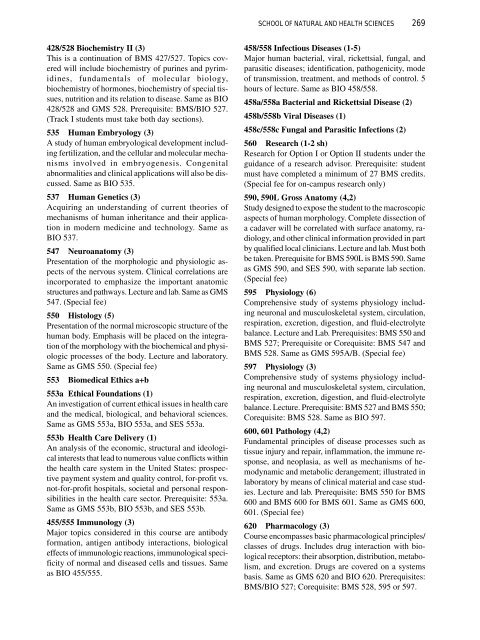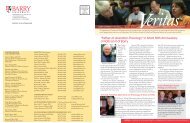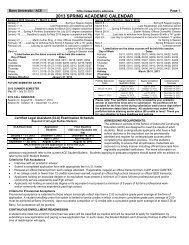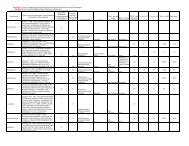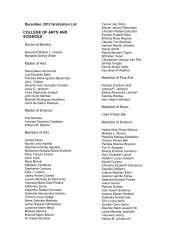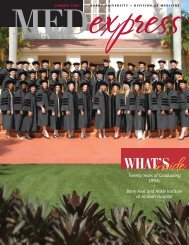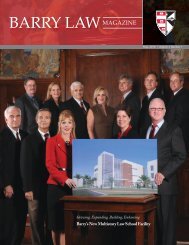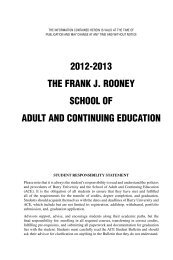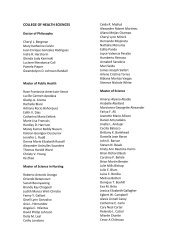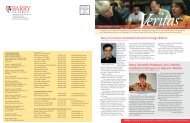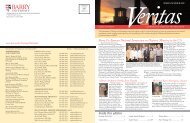2004-2005 - Barry University
2004-2005 - Barry University
2004-2005 - Barry University
You also want an ePaper? Increase the reach of your titles
YUMPU automatically turns print PDFs into web optimized ePapers that Google loves.
428/528 Biochemistry II (3)<br />
This is a continuation of BMS 427/527. Topics covered<br />
will include biochemistry of purines and pyrimidines,<br />
fundamentals of molecular biology,<br />
biochemistry of hormones, biochemistry of special tissues,<br />
nutrition and its relation to disease. Same as BIO<br />
428/528 and GMS 528. Prerequisite: BMS/BIO 527.<br />
(Track I students must take both day sections).<br />
535 Human Embryology (3)<br />
A study of human embryological development including<br />
fertilization, and the cellular and molecular mechanisms<br />
involved in embryogenesis. Congenital<br />
abnormalities and clinical applications will also be discussed.<br />
Same as BIO 535.<br />
537 Human Genetics (3)<br />
Acquiring an understanding of current theories of<br />
mechanisms of human inheritance and their application<br />
in modern medicine and technology. Same as<br />
BIO 537.<br />
547 Neuroanatomy (3)<br />
Presentation of the morphologic and physiologic aspects<br />
of the nervous system. Clinical correlations are<br />
incorporated to emphasize the important anatomic<br />
structures and pathways. Lecture and lab. Same as GMS<br />
547. (Special fee)<br />
550 Histology (5)<br />
Presentation of the normal microscopic structure of the<br />
human body. Emphasis will be placed on the integration<br />
of the morphology with the biochemical and physiologic<br />
processes of the body. Lecture and laboratory.<br />
Same as GMS 550. (Special fee)<br />
553 Biomedical Ethics a+b<br />
553a Ethical Foundations (1)<br />
An investigation of current ethical issues in health care<br />
and the medical, biological, and behavioral sciences.<br />
Same as GMS 553a, BIO 553a, and SES 553a.<br />
553b Health Care Delivery (1)<br />
An analysis of the economic, structural and ideological<br />
interests that lead to numerous value conflicts within<br />
the health care system in the United States: prospective<br />
payment system and quality control, for-profit vs.<br />
not-for-profit hospitals, societal and personal responsibilities<br />
in the health care sector. Prerequisite: 553a.<br />
Same as GMS 553b, BIO 553b, and SES 553b.<br />
455/555 Immunology (3)<br />
Major topics considered in this course are antibody<br />
formation, antigen antibody interactions, biological<br />
effects of immunologic reactions, immunological specificity<br />
of normal and diseased cells and tissues. Same<br />
as BIO 455/555.<br />
SCHOOL OF NATURAL AND HEALTH SCIENCES 269<br />
458/558 Infectious Diseases (1-5)<br />
Major human bacterial, viral, rickettsial, fungal, and<br />
parasitic diseases; identification, pathogenicity, mode<br />
of transmission, treatment, and methods of control. 5<br />
hours of lecture. Same as BIO 458/558.<br />
458a/558a Bacterial and Rickettsial Disease (2)<br />
458b/558b Viral Diseases (1)<br />
458c/558c Fungal and Parasitic Infections (2)<br />
560 Research (1-2 sh)<br />
Research for Option I or Option II students under the<br />
guidance of a research advisor. Prerequisite: student<br />
must have completed a minimum of 27 BMS credits.<br />
(Special fee for on-campus research only)<br />
590, 590L Gross Anatomy (4,2)<br />
Study designed to expose the student to the macroscopic<br />
aspects of human morphology. Complete dissection of<br />
a cadaver will be correlated with surface anatomy, radiology,<br />
and other clinical information provided in part<br />
by qualified local clinicians. Lecture and lab. Must both<br />
be taken. Prerequisite for BMS 590L is BMS 590. Same<br />
as GMS 590, and SES 590, with separate lab section.<br />
(Special fee)<br />
595 Physiology (6)<br />
Comprehensive study of systems physiology including<br />
neuronal and musculoskeletal system, circulation,<br />
respiration, excretion, digestion, and fluid-electrolyte<br />
balance. Lecture and Lab. Prerequisites: BMS 550 and<br />
BMS 527; Prerequisite or Corequisite: BMS 547 and<br />
BMS 528. Same as GMS 595A/B. (Special fee)<br />
597 Physiology (3)<br />
Comprehensive study of systems physiology including<br />
neuronal and musculoskeletal system, circulation,<br />
respiration, excretion, digestion, and fluid-electrolyte<br />
balance. Lecture. Prerequisite: BMS 527 and BMS 550;<br />
Corequisite: BMS 528. Same as BIO 597.<br />
600, 601 Pathology (4,2)<br />
Fundamental principles of disease processes such as<br />
tissue injury and repair, inflammation, the immune response,<br />
and neoplasia, as well as mechanisms of hemodynamic<br />
and metabolic derangement; illustrated in<br />
laboratory by means of clinical material and case studies.<br />
Lecture and lab. Prerequisite: BMS 550 for BMS<br />
600 and BMS 600 for BMS 601. Same as GMS 600,<br />
601. (Special fee)<br />
620 Pharmacology (3)<br />
Course encompasses basic pharmacological principles/<br />
classes of drugs. Includes drug interaction with biological<br />
receptors: their absorption, distribution, metabolism,<br />
and excretion. Drugs are covered on a systems<br />
basis. Same as GMS 620 and BIO 620. Prerequisites:<br />
BMS/BIO 527; Corequisite: BMS 528, 595 or 597.


